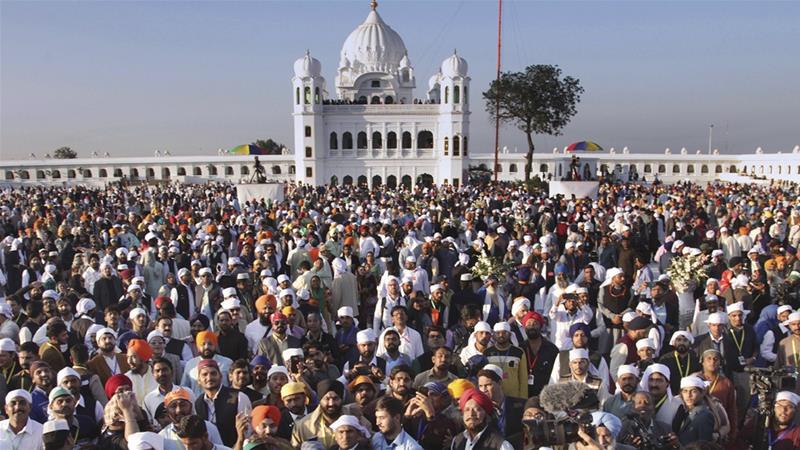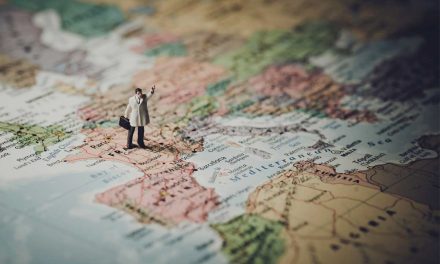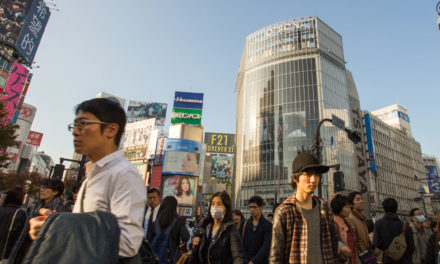Hundreds of Indian Sikhs made a historic pilgrimage to Pakistan to mark the celebration of the 550th birth anniversary of Guru Nanak Dev, the founder of the religion, after a landmark opening of the Kartarpur corridor on Saturday.
Today is the first time since the subcontinent’s partition that Indian Sikh pilgrims can access the Gurdwara Darbar Sahib Kartarpur in Pakistan without first obtaining a visa.
“Generally, people say that God is everywhere. But this walk feels like I’m going to directly seek blessings from Guru Nanak,” Surjit Singh Bajwa told AFP as he walked towards the corridor, crying as he spoke.
The Kartarpur Corridor is a border corridor that links Dera Baba Nanak in Gurdaspur, India, and Gurdwara Darbar Sahib in Kartarpur, Pakistan. It extends 2.5 miles from the international border.
Kartarpur is considered one of the holiest sites under Sikhism, where Guru Nanak is said to have spent the last 18 years of his life. The Kartapur Gurudwara covers 42 acres, making it one of the largest in the world.
Who is Guru Nanak?
Guru Nanak was born into a Hindu family in 1469 in Northern Punjab – now Pakistan since 1947. He was the founder of the Sikh faith and spent his life teaching, writing, and traveling.
Sikhs believe in one god who guides and protects them. They believe life should be led with three principles in mind: honest living and hard work, remembering God always, and sharing your time and wealth with those less fortunate.
Five and a half centuries later, Sikhs number up to 30 million worldwide, with a rich diaspora in places such as Canada, the US and Europe — although the vast majority remain in India.
Previously, Sikh pilgrims from India had to take a bus to Lahore to get to Kartarpur, which is more than a 100-kilometer journey. Those who didn’t have visas used an elevated observation platform constructed on the Indian side to get a view of the holy site in Pakistan through binoculars.
The Partition and displacement of millions
When the partition took place in 1947, millions of lives were left completely shambled, especially those from Punjab and Bengal, the two large states that were most impacted by the country’s division. Several million Sikhs living in parts of Pakistan had to not only leave their lands, livelihoods, and companions to flee to India, they also had to leave behind large parts of their heritage as an undivided Punjab was the ground that Sikhism was founded and flourished on for centuries.
The boiling political tensions between neighbours
For seven decades, Sikhs have been yearning to visit the spiritual sites across the border. In 2000, the two nations agreed to build a bridge to allow visa-free access into the holy site for pilgrimage. However, the corridor, like much else between India and Pakistan, has been hostage to the spiralling bilateral ties. Recent events like the turmoil in Jammu and Kashmir put steps to open the corridor on hold.
What is visa-free travel?
Visa-free travel is the ability to enter a country without obtaining a visa in advance. This allows travelers to move freely across borders with their passports. Certain countries have agreements with others to allow their citizens to travel there without needing to go through a lengthy visa procedure.
Many high net-worth individuals opt to invest in a second citizenship because the passport they hold requires them to go through visa paperwork when traveling to certain countries – something extremely inconvenient for urgent business trips or health tourism.
The boiling political tensions between neighbours
For seven decades, Sikhs have been yearning to visit the spiritual sites across the border. In 2000, the two nations agreed to build a bridge to allow visa-free access into the holy site. However, the corridor, like much else between India and Pakistan, has been hostage to the spiralling bilateral ties. Recent events like the turmoil in Jammu and Kashmir put steps to open the corridor on hold.
The significance of an open corridor
Against this backdrop, the fact that the corridor has indeed opened now marks a historic occasion. This is important, not only for the Indian Sikh community, but it is also a marvellous booster of morale for devotees of Guru Nanak living in Pakistan.
Speaking at the inauguration ceremony this weekend, Pakistan’s Prime Minister Imran welcomed the Sikh pilgrims to Pakistan.
“There is humanity in the philosophy of Guru Nanak,” he said. “Humanity is what separates human beings from animals. Our God also talks about humanity and our Holy Prophet Muhammad (PBUH) was sent as a mercy for all mankind.”
Among the first pilgrims was former Indian Prime Minister Manmohan Singh, who told Pakistani state media that it was a “big moment”.
Indian Prime Minister Narendra Modi thanked Khan and called the project a “blissful blessing,” saying that the project may help in easing tensions between the two countries.
About 8,000-10,000 pilgrims are expected to arrive from around the world to mark Guru Nanak’s 550th birth anniversary today.
- Travellers are Rethinking Flying as Flight Shaming Takes Off - 1st March 2021
- Oxford-Backed Project Connects Partition Survivors to Their Ancestral Homes - 22nd February 2021
- Helping Your Own: A Young Aslyum Seeker Explains the Importance of Volunteering in the COVID Era - 7th September 2020






